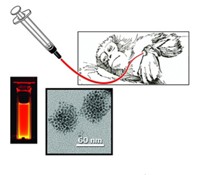Advertisement
Grab your lab coat. Let's get started
Welcome!
Welcome!
Create an account below to get 6 C&EN articles per month, receive newsletters and more - all free.
It seems this is your first time logging in online. Please enter the following information to continue.
As an ACS member you automatically get access to this site. All we need is few more details to create your reading experience.
Not you? Sign in with a different account.
Not you? Sign in with a different account.
ERROR 1
ERROR 1
ERROR 2
ERROR 2
ERROR 2
ERROR 2
ERROR 2
Password and Confirm password must match.
If you have an ACS member number, please enter it here so we can link this account to your membership. (optional)
ERROR 2
ACS values your privacy. By submitting your information, you are gaining access to C&EN and subscribing to our weekly newsletter. We use the information you provide to make your reading experience better, and we will never sell your data to third party members.
Materials
Nanotoxicity
In vivo study of fullerenes contradicts in vitro data
by Bethany Halford
July 23, 2007
| A version of this story appeared in
Volume 85, Issue 30
Fullerenes exhibit little pulmonary toxicity in vivo, according to a new study in rats (Nano Lett., DOI: 10.1021/nl0710710). The finding is contrary to those of earlier in vitro tests that showed that C60 is toxic to human cells, including dermal fibroblasts, lung epithelial cells, and astrocytes.
Christie M. Sayes, David B. Warheit, and colleagues at the DuPont Haskell Laboratory for Health & Environmental Sciences, in Newark, Del., took aqueous solutions of nano—C60-a water-soluble aggregate of pristine, underivatized C60—and instilled them into the trachea of rats. They then examined the animals' lungs after one day, one week, one month, and three months. A similar experiment was carried out with the compound C60(OH)24, a fullerene derivative that has been shown to be benign in in vitro tests.
In both cases, the DuPont team found only transitory inflammatory and cell injury effects, probably due to the instillation procedure. Even with the highest dose of fullerenes, no adverse pulmonary effects were observed after three months of exposure, the researchers report.
"The results demonstrate that understanding how nanomaterials interact with the body is more complex than can currently be determined from in vitro studies alone and support the need for systematic research into underlying mechanisms of interaction," comments Andrew Maynard, chief scientific adviser for the Project on Emerging Nanotechnologies at the Woodrow Wilson International Center for Scholars, in Washington, D.C.



Join the conversation
Contact the reporter
Submit a Letter to the Editor for publication
Engage with us on Twitter